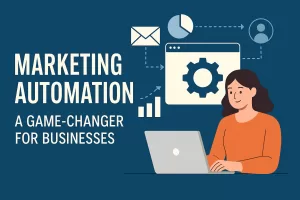
Introduction to Marketing Automation
Marketing automation is revolutionizing the way businesses engage with customers. In today's fast-paced world, businesses are always on the lookout for ways to streamline their processes and make operations more efficient. One of the most effective ways to achieve this is through marketing automation. But what exactly is marketing automation, and why is it so important for businesses in 2025? Let's dive in and explore the power of automating your marketing efforts.
What is Marketing Automation?
Marketing automation refers to the use of software and technology to automate repetitive marketing tasks, such as email marketing, social media posting, and customer data management. Instead of manually handling each task, marketing automation tools take over, allowing businesses to save time, enhance productivity, and improve customer engagement.
Why is Marketing Automation Important?
In an era where customers expect personalized experiences and fast responses, marketing automation helps businesses keep up with these demands. It enables companies to deliver timely, relevant content to their audience at scale, without sacrificing personalization or quality.
Understanding the Basics of Marketing Automation
What Does Marketing Automation Involve?
At its core, marketing automation involves setting up systems that can automatically handle various aspects of your marketing strategy. This includes sending emails based on user behavior, scheduling social media posts, and even managing customer relationships through CRM systems.
Key Components of Marketing Automation
- Email Marketing: Automatically sending targeted emails based on user behavior and preferences.
- Lead Generation and Nurturing: Capturing leads and nurturing them through the sales funnel with automated follow-ups.
- Analytics and Reporting: Tracking the success of campaigns, gathering insights, and using data to optimize future efforts.
Benefits of Implementing Marketing Automation
Marketing automation brings several advantages that make it a must-have for businesses looking to stay competitive.
Time-Saving Efficiency
By automating repetitive tasks, your marketing Automation team can focus on more strategic activities. From setting up automated email campaigns to managing social media posts, automation allows for smooth operations.
Personalized Customer Engagement
Marketing automation allows for dynamic personalization of content, ensuring customers receive messages that are relevant to their needs and interests. For instance, a customer browsing a product page may automatically receive an email with a special discount for that item.
Improved Data Analysis and Reporting
With automation, it's easier to track customer behaviors and interactions. This data can then be used to generate detailed reports, helping businesses make informed decisions and refine their marketing strategies.
Types of Marketing Automation
Marketing automation isn't one-size-fits-all. There are several types tailored to different marketing channels.
Email Marketing Automation
Email marketing is one of the most common uses for automation. You can set up welcome emails, abandoned cart reminders, and re-engagement campaigns that trigger based on specific actions from your customers.
Social Media Automation
Social media platforms are ideal for automation. With tools like Buffer or Hootsuite, you can schedule posts in advance, track social media mentions, and engage with your audience even when you're not online.
Customer Relationship Management (CRM) Integration
A robust CRM system integrated with marketing automation software allows businesses to track customer interactions across various touchpoints, from website visits to email opens, creating a comprehensive customer profile.
How Marketing Automation Works
Setting Up Marketing Automation Systems
To make the most of marketing automation, businesses need to integrate the right tools and systems. This involves selecting the right platform, designing workflows, and segmenting the audience for targeted campaigns.
Creating Effective Campaigns with Automation
Effective marketing automation campaigns require thoughtful planning. You'll need to map out customer journeys, create content that resonates with each segment, and set triggers to ensure timely delivery.
Popular Marketing Automation Tools and Platforms
Several marketing automation tools stand out in the market for their features and ease of use.
HubSpot
HubSpot is a comprehensive inbound marketing tool that includes email automation, lead nurturing, and analytics features, making it a great choice for businesses looking to scale their marketing efforts.
Marketo
Marketo is a powerful automation platform for enterprise-level companies. It offers robust email marketing, lead management, and CRM integration.
Mailchimp
Mailchimp is popular for its simplicity and affordability, especially for small businesses. It offers email marketing automation and basic analytics tools.
ActiveCampaign
ActiveCampaign is known for its email marketing automation, CRM, and advanced segmentation features, allowing businesses to tailor campaigns to specific customer needs.
Best Practices for Marketing Automation
Segmentation and Targeting
The key to successful automation is ensuring that your messages reach the right people. Segment your audience based on behavior, demographics, or past interactions for better targeting.
A/B Testing for Optimization
Test different versions of emails, landing pages, and ads to see what resonates most with your audience. A/B testing ensures that your automated campaigns are constantly improving.
Creating Dynamic and Engaging Content
Your automated messages should still feel personal and engaging. Use dynamic content to adapt your messaging based on customer interests and behaviors.
Common Mistakes to Avoid in Marketing Automation
Over-Automating Customer Interactions
While automation saves time, over-relying on it can create a robotic, impersonal experience. Always make room for human interactions when needed.
Neglecting Regular Updates and Monitoring
Marketing automation requires regular monitoring and tweaking to remain effective. Don't set it and forget it—ensure that your workflows and campaigns are always up-to-date.
The Future of Marketing Automation
As technology advances, marketing automation continues to evolve.
AI and Machine Learning Integration
The integration of artificial intelligence and machine learning into marketing automation systems will enable even more advanced personalization and predictive analytics, improving customer experiences.
Personalization Trends
Expect more automation tools to focus on delivering hyper-personalized content to each individual, making every interaction feel more relevant and timely.
How Marketing Automation is Evolving
The Rise of Omnichannel Marketing Automation
Omnichannel automation is becoming increasingly important as businesses aim to provide seamless experiences across multiple touchpoints, from email to social media to in-app messaging.
Automation for Small Businesses
Marketing automation is no longer just for big companies. Small businesses are increasingly using affordable tools to automate their marketing efforts, making it accessible to all.
Conclusion
In conclusion, marketing automation is a powerful tool that can help businesses streamline operations, engage with customers more effectively, and gain valuable insights. As technology continues to advance, the possibilities for marketing automation are endless. Whether you're a small business or a large enterprise, automating your marketing efforts is a step towards success.
FAQs
- What is the best marketing automation platform for beginners?
Platforms like Mailchimp or ActiveCampaign are ideal for beginners due to their user-friendly interfaces and affordable pricing. - Can marketing automation help increase ROI?
Yes, by automating repetitive tasks, businesses can save time, reduce costs, and improve targeting, which often leads to higher returns on investment. - How can I personalize my email marketing automation?
Use customer data, such as purchase history and browsing behavior, to create personalized email content tailored to each recipient. - Is marketing automation only for large businesses?
No, marketing automation tools are available for businesses of all sizes. Even small businesses can benefit from affordable, scaled-down automation tools. - What are the costs associated with marketing automation tools?
The cost varies depending on the platform and features you choose. Small businesses can often find cost-effective options, while larger enterprises may require more advanced solutions.
